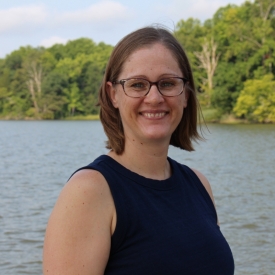Interns
Research in the Coastal Disease Ecology Laboratory at the Smithsonian Environmental Research Center includes a wide range of topics related to parasite and infectious disease ecology in coastal aquatic ecosystems. This research examines the diversity, abundance, and host specificity of both micro- and macroparasites that infect a range of marine hosts, from crustaceans to seagrasses. Fieldwork for collecting host samples utilizes kayaking, seining, trawling, sediment cores, and water samples. Laboratory techniques typically include dissections and genetic methods.
Researchers at SERC have been conducting long-term monitoring of communities in the Rhode River, including benthic surveys, monitoring oyster beds, and nearshore surveys. Interns participate in these surveys, dissect the animals collected, and record the prevalence, diversity, and abundance of parasites found in each host.
Additionally, all interns and volunteers have the opportunity to conduct independent research projects that are within the scope of the Coastal Disease Ecology lab, the focus of which varies depending on available funding.
For more information about our research projects, check out our Coastal Disease Research Projects.
For more information on how to apply for an internship at SERC, visit the Internships page.
Learning Objectives for Internships
Interns interact with research scientists, technicians, and postdocs across a variety of labs at SERC including the Coastal Disease Ecology Lab, Marine Invasions Research Lab, MarineGEO, Ecosystem Conservation Lab, and Fisheries Conservation Lab.
- Training in field and lab techniques related to their project including field sampling design and methods, data management, data collection, data entry and verification, dissections, and sample preservation.
- Summarize his/her accomplishments in a public seminar at the end of the project period under the supervision of lab scientists.
- Work in a collaborative setting, across research groups.
- Write specific sampling and laboratory protocols.
- Find and identify a variety of aquatic parasites from a wide range of hosts.
Intern Alumns:
High School Interns: Anulouwapo Favour Kayode (2023), Augusta Quilliam (2021- 2022), Jesse Paige (2021- 2022), Caroline Connolly (2020)
Undergraduate Interns: Kayla Geronimo-Anctil (2023 – 2024), Kiyomi Johnson (2023 – 2024), Hannah Brunelle (2022-2023), Itzayana Lainez-Rojas (2022), Diana Portugal Barron (2021- 2022), Monserrat Garcia Ruiz (2021), Alexis Betancourt (2021), Chloé Lo Faro (2021), Jaeda Roberts (2020-2021), Matilda Newcomb (2018, 2019), Annette Curry (2018), Miguel Aguirre Morales (2018), Madison Miller (2017), Nancy Sealover (2016), Emily Bulger (2014)
Post-Baccalaureate Interns: Grace Avalos (2024), Allie Yoon Gallagher (2024), Iyana Oliviel (2023), Roberta D’Camp (2023), Karson Burton-Reeder (2023), Anna Mehlhorn (2023), Elaine Lachin (2022-2024), Monserrat Garcia Ruiz (2022), Alicia Flores (2019)






